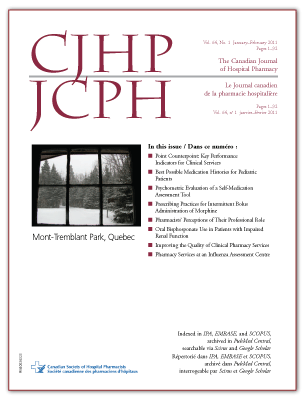Use of Oral Bisphosphonates by Older Adults with Fractures and Impaired Renal Function
DOI:
https://doi.org/10.4212/cjhp.v64i1.985Keywords:
osteoporosis, renal insufficiency, chronic kidney disease, bisphosphonate, alendronate, risedronate, ostéoporose, insuffisance rénale, maladie rénale chronique, risédronateAbstract
ABSTRACT
Background: The manufacturers of oral bisphosphonates (alendronate, risedronate) recommend avoiding use of these drugs in patients with renal impairment. However, many patients who have osteoporosis or who are at risk of fracture are elderly and may have renal impairment. This situation poses a quandary for clinicians in deciding how best to manage osteoporosis in this high-risk population.
Objective: To synthesize published evidence regarding the use and safety of oral bisphosphonates for patients with impaired renal function.
Methods: The following databases were searched up to October 2010: PubMed, MEDLINE, Embase, the Cochrane Library, and International Pharmaceutical Abstracts. The following key words and terms were used for the searches: bisphosphonates, alendronate, risedronate, Fosamax, Actonel, "renal failure", "renal insufficiency", "chronic kidney disease", and "end-stage renal disease". The manufacturers of Fosamax and Actonel were asked to provide information about use of their products in patients with renal impairment, including unpublished pharmaco - kinetic studies or reports of adverse drug events.
Results: The search yielded 2 post hoc analyses of safety data, 1 case-control study, 1 case series, 4 retrospective chart analyses, and 2 prospective studies. According to these publications, numerous patients with decreased renal function have received bisphosphonates and have experienced improvement in bone mineral density and/or reduction in risk of fractures, with no increase in adverse effects. Increased renal damage occurred in some individuals with underlying renal disorders, as described in case reports.
Conclusions: Although the literature is limited, there is evidence that alendronate and risedronate are well tolerated and effective when used by individuals with renal impairment. Further research is required to confirm the benefits and risks of using these medications in patients with renal impairment.
RÉSUMÉ
Contexte : Les fabricants de bisphosphonates oraux (alendronate, risédronate) recommandent d'éviter l'emploi de ces médicaments chez les patients souffrant d'insuffisance rénale. Cependant, de nombreux patients souffrant d'ostéoporose ou qui sont à risque de fracture sont des personnes âgées qui pourraient souffrir d'insuffisance rénale. Cette situation est un véritable dilemme pour les cliniciens qui doivent décider de la meilleure conduite à tenir pour traiter l'ostéoporose chez cette population à risque élevé.
Objectif : Mettre en lumière les données probantes publiées sur l'emploi et l'innocuité des bisphosphonates oraux chez les patients souffrant d'insuffisance rénale.
Méthodes : Les bases de données suivantes ont été examinées : PubMed, MEDLINE, Embase, Bibliothèque Cochrane et International Pharmaceutical Abstracts. Les mots clés et termes suivants ont été utilisés pour les recherches : bisphosphonates, alendronate, risédronate, Actonel, Fosamax, « insuffisance rénale », « maladie rénale chronique » et « insuffisance rénale terminale ». Les recherches dans les bases de données ont été faites jusqu'en octobre 2010. On a demandé aux fabricants d'Actonel et de Fosamax de fournir de l'information sur l'utilisation de leurs produits chez les patients atteints d'insuffisance rénale, y compris les résultats d'études pharmacocinétiques inédites ou les rapports d'événements indésirables liés aux médicaments.
Résultats : La recherche a révélé deux analyses a posteriori de données sur l'innocuité, une étude cas-témoin, une série de cas, quatre analyses rétrospectives de dossiers médicaux et deux études prospectives. D'après ces documents, de nombreux patients atteints d'insuffisance rénale ont reçu des bisphosphonates et présenté un accroissement de leur densité minérale osseuse ou une réduction du risque de fractures, sans augmentation des effets indésirables. On a observé une augmentation des lésions rénales chez certains patients présentant des troubles rénaux sous-jacents, comme décrit dans plusieurs observations cliniques.
Conclusions : Bien que la documentation soit limitée, des données probantes montrent que l'alendronate et le risédronate sont bien tolérés et efficaces dans les cas d'insuffisance rénale. Des recherches plus approfondies sont nécessaires pour confirmer les bienfaits et les risques de ces médicaments chez les personnes souffrant d'insuffisance rénale.
Downloads
Issue
Section
License
Copyright © Canadian Society of Healthcare-Systems Pharmacy.
After publication of a manuscript in the CJHP, the authors of the manuscript must obtain written permission from the CSHP (publications@cshp.ca) before reproducing any text, figures, tables, or illustrations from the work in future works of their own. If a submitted manuscript is declined for publication in the CJHP, all said rights shall revert to the authors. Please note that any forms (e.g., preprinted orders and patient intake forms) used by a specific hospital or other health care facility and included as illustrative material with a manuscript are exempt from this copyright transfer. The CJHP will require a letter from the hospital or health care facility granting permission to publish the document(s).










